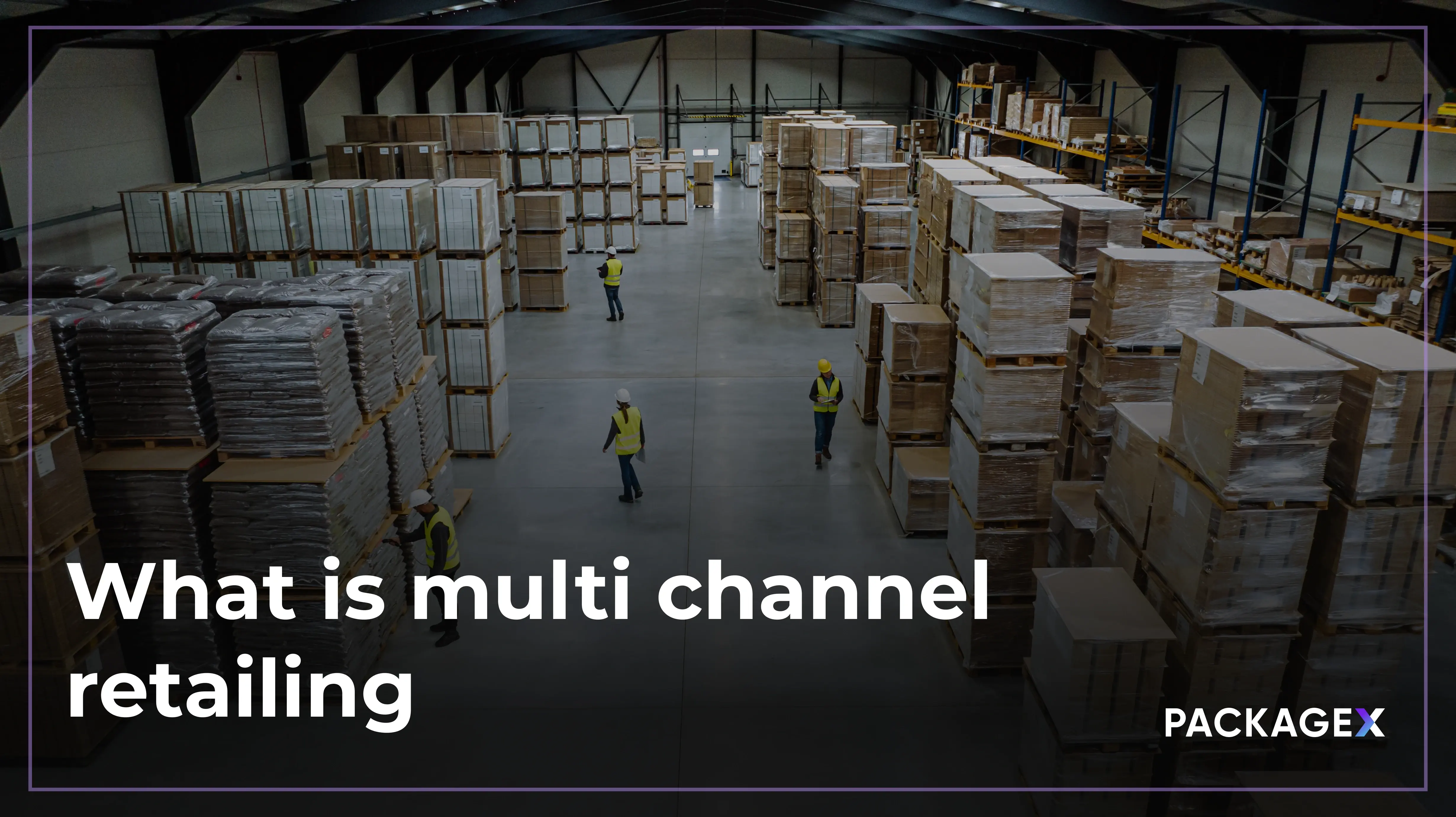An old English proverb says, “There’s many a slip between the cup and the lip.” It implies that unforeseen challenges can complicate an activity before it is completed.
Nobody knows this better than businesses engaged in shipping goods to their customers. Fulfilling an order only seems straightforward. In reality, there are many things that can go wrong between the time a package leaves the warehouse and reaches the customer. In order to simplify the process of transporting goods, many direct-to-customer retailers choose to work with a logistics company.
This article is an introduction to logistics companies, the work they do, and the advantages they offer to their business partners. If an ecommerce business relies on shipping goods, finding the right logistics company to partner with can transform their entire supply chain!
Understanding logistics
Before examining logistics companies and their workings, let’s briefly look at the reason for their existence. Logistics is the process of storing and transporting goods from their point of origin to their point of consumption in a timely and efficient manner. Ensuring logistics run smoothly is a key component of an overall supply chain management strategy.
This is especially true for the small and medium-sized ecommerce industry. Smaller retailers compete with giants like Amazon, which offers fast, convenient, and cheap delivery options. This means that smaller businesses can potentially lose out on customers who are always looking for better delivery options. In fact, as many as 84% of shoppers in a survey said they wouldn’t return to a company after just one negative experience.
That’s a very narrow margin for error, and ecommerce retailers can’t afford to make mistakes if they want to retain customers. Luckily, even if a business doesn’t have the resources to set up an efficient shipping and distribution network that competes with industry leaders, there are others that can help. Logistics companies are a savior when there is a need to optimize a business’ logistics operations.
What do logistics companies do?
Many retailers who have just started operations think they can handle the responsibilities that come with the self-fulfillment of customer orders. They soon realize that their supply chain won't function as planned without experience in warehouse management, inventory management, and moving goods. This leads to shipment delays, which in turn leads to customers abandoning a brand and seeking alternatives.
Working with a logistics company can prevent this scenario from happening.
Logistics companies specialize in storing and moving another company’s goods within their supply chain. And it’s not just transportation—logistics companies can also manage every other aspect of their clients’ supply chains, depending on each client’s requirements.
Functions of a logistics company
From planning out the supply chain to actually executing order fulfillment, logistics companies contribute to moving goods at every stage of the process. They perform many functions that add value to any business, and we shall look at these in more detail.
1. Warehouse management
A warehouse is the central hub of a distribution network, especially for an ecommerce retailer who doesn’t have a physical store. All the orders received will have to be processed, prepared for shipping, and dispatched from the warehouse. Logistics companies take on warehousing responsibilities, including tracking stored inventory and preparing packages for shipping on time.
2. Packaging
First impressions are important, and the first thing customers see when they receive their orders is the packaging. While some goods might come pre-packaged for retail, transport packaging is an entirely different affair. Logistics companies help clients by providing durable yet compact transport packaging that protects goods from damage during shipping.
3. Transportation
The prime function of any logistics company is to assist in the movement of goods. Regardless of what other services they offer, all logistics companies will have a solution for transporting goods from their point of origin to their point of consumption. Different logistics companies specialize in transportation over short, medium, and long distances, with some even helping move goods across international borders.
4. Inventory management
Having an efficient transportation network is pointless if inventory management is shoddy. Simply put, inventory management is all about ensuring goods are in stock and easily accessible when it’s time to fulfill customer orders. Many logistics companies have optimized inventory management with software that tracks inventory levels and automatically routes orders to the closest fulfillment center.
Modern inventory management software is extremely valuable in optimizing logistics operations and reducing costs. It accomplishes this by streamlining logistics workflows, which means less time and resources are spent on tracking inventory. Using inventory management also enables the automatic cataloging of inbound shipments, instant generation of packing slips for outbound packages, and the creation of shipping labels for orders before they are dispatched.
5. Data collection
Logistics is an ongoing process. Every logistics action yields new insights into how the process can be further streamlined and made efficient. Logistics companies track various metrics and collect important data related to order fulfillment that helps retailers fine-tune their supply chain management strategies.
All this data also helps fine-tune warehouse management software (WMS) and optimize shipping methods. Digitizing the logistics process enables greater transparency and a measurement of how efficiently they are performing.
6. Order tracking
Once an order is dispatched from a storage center, it’s vital to keep a tab on its location. Both customers and sellers benefit from being able to track their orders through the supply chain. Logistics companies make it easy to instantly access information about the status and location of every package in transit.
Tracking packages is easier than ever before with modern digital solutions. The ability to track a package in real-time and receive updates about its progress gives the seller a greater degree of control over the customer’s delivery experience. For retailers who send out a high volume of orders daily, having software that tracks all their orders in transit is a must.
7. Customer service
Apart from order tracking, customers might have other needs while they wait for their package. From special delivery instructions to responding to customer queries, some logistics companies add value for retailers by offering additional customer service functions.
Types of logistics companies
Order fulfillment can be complicated, as ecommerce sellers know all too well. Individual sellers will face different challenges based on their own approach to supply chain management. In order to cater to the wide range of requirements, multiple kinds of logistics companies have emerged. Each type of logistics company offers different services, so it is best to choose one that suits specific business needs.
The three main types of logistics companies are:
1. Freight brokers
A freight broker’s role is to act as an intermediary between the seller and the carrier. However, two different types of companies engage in freight brokering and offer different services. The two types of freight brokers available are:
- Freight companies: These companies are directly engaged in transporting goods. Freight companies usually specialize in a particular mode of transport, like road, rail, air, or sea.
- Freight forwarders: Instead of directly transporting the goods, freight forwarders act as agents who facilitate the goods’ movement. They handle documentation for imports and exports and coordinate transportation solutions between shippers and freight carriers.
2. Carriers
In logistics, a carrier is a company that only offers transportation services for goods. These companies handle the goods directly and are typically trucking, rail, air cargo, and ocean freight companies.
3. Third-party logistics (3PL) companies
Out of the many types of logistics companies, 3PL companies offer the most comprehensive solutions. They don’t simply handle freight — they also tackle all the other aspects of the supply chain as per their client’s requirements. The services offered by 3PL companies include distribution, storage, transportation, and fulfillment. Modern 3PL companies also harness the power of technology, using machine learning (ML), artificial intelligence (AI), and advanced analytics to deliver the best possible results over time.
Why is partnering with a logistics company necessary?
Efficiently managing delivery operations is crucial for any company’s success, especially in ecommerce. A business should ask itself these questions to determine if it needs to partner with a logistics solutions provider:
- Are shipments regularly delayed?
- Have customers expressed dissatisfaction about order fulfillment?
- Are employees overwhelmed by order processing tasks?
- Is the warehouse and inventory management system working as intended?
- Will sales see a sudden increase due to seasonal demand?
If the answer is “Yes” to any of the questions above, it’s likely that partnering with a logistics company will be beneficial for the business.
{{returns-webinar}}
The benefits of partnering with a logistics company include:
Expanding into new markets
Setting up a distribution in a new market can be tricky. Thankfully, 3PL companies can help businesses establish new networks by providing inventory management and fulfillment services to reach customers in untapped markets.
Reducing risk
A logistics company will step in to solve problems in a client’s supply chain before they adversely affect business operations. This reduces the risk associated with transporting goods using self-fulfillment methods.
Eliminating stress
The paperwork involved in processing orders and moving them across borders can be time-consuming and stressful. By outsourcing this to a logistics company, employees are freed up to focus on more critical tasks.
Lower costs
Most logistics companies have standing deals with carriers to get preferential shipment rates. Their clients also enjoy discounted rates, bringing the cost of transportation down. By optimizing inventory management and finding appropriate storage solutions, logistics companies can also reduce operational costs.
PackageX: The perfect logistics partner for retail businesses
Over 90% of companies surveyed by McKinsey in 2022 reported investing in digital supply chain technologies, a sign that businesses were aware they needed help with logistics. Whether an ecommerce business is looking for solutions in inventory management, order fulfillment, or shipping for deliveries and returns, PackageX has the answer. With AI-enhanced capabilities, PackageX is the ideal logistics partner for a fast-moving, data-driven, digital world.




.webp)